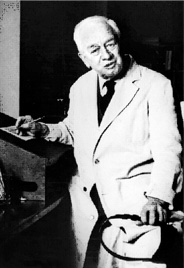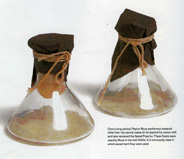Discovering the First Cancer-Causing Virus

Rous, Peyton
Courtesy of the Rockefeller Archive Center
In 1911 Peyton Rous (1879-1970) made the startling discovery that a virus could cause cancer. A farmer had brought him a hen with a large lump in her breast. Rous, a pathologist, diagnosed the lump as a sarcoma—a tumor of cells in the connective tissue. He first tested whether the tumor could be transplanted into chickens closely related to the original one. It could, and with each passing, the tumor became more aggressive. To find out whether an infectious agent caused the cancer, Rous prepared an extract—he minced a sample of the tumor tissue in saline solution and passed this through a filter to eliminate bacteria and tumor cells. Then he injected the extract into healthy chickens. Contrary to his expectations, it produced new tumors!
Describing these experiments, Rous suggested that the tumor-inducing agent was "a minute parasitic organism"—a virus. At the time Rous did this research, however, viruses were poorly understood and the causes of cancer were even more mysterious. It was more than 50 years later, in 1966, that the significance of Rous's discovery was recognized with a Nobel Prize.

These flasks were used by Rous in mid 1930s
The assertion that a virus could induce tumors was so controversial that, after a few more studies, Rous abandoned cancer research until the 1930s, when his colleague at the Rockefeller Institute, Richard Shope, discovered another tumor caused by a virus—a papilloma, or wart, found in rabbits. Rous returned to studying cancer, keeping alive the viral theory of cancer causation. Only in the 1950s was the so-called Rous sarcoma virus widely adopted as a tool, because—unlike chemicals or radiation—it reliably and reproducibly induced tumors. In the 1960s a gene called src was identified as producing the protein that leads to tumors. Decades after Rous's original description, the Rous sarcoma virus, now known to be a retrovirus, remains important in research.
Peyton Rous received the BA from The Johns Hopkins University in 1900, and the MD from that university's Medical School in 1905. After teaching pathology at the University of Michigan, he joined the Rockefeller Institute in 1909, becoming a full member (professor) in 1930. He remained at Rockefeller his entire career. Among dozens of awards and honorary degrees, he received the National Medal of Science (1965), the Lasker Award (1958), and the Nobel Prize (1966). He served as editor of the Journal of Experimental Medicine.
Selected Publications
Rous P. Transmission of a malignant new growth by means of a cell-free filtrate. JAMA, 1911, 56:198
Rous P. A sarcoma of the fowl transmissible by an agent separable from the tumor cells. J Exp Med, 1911, 13:397-411
http://www.jem.org/cgi/reprint/13/4/397
Rous P. The virus tumors and the tumor problem (Harvey Lecture). Am J Cancer, 1936, 28:233-271
